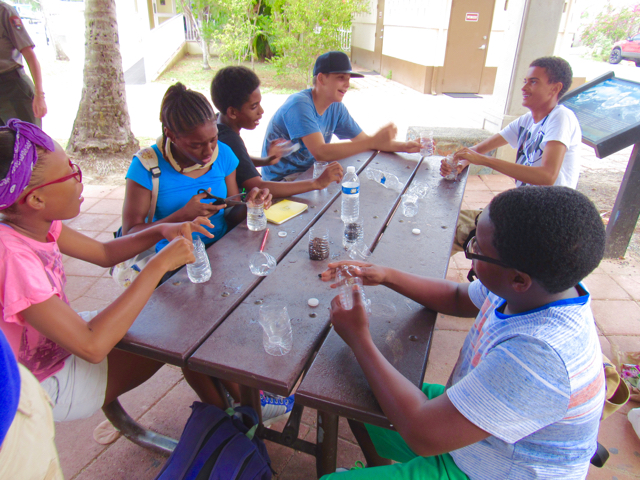.jpg)
The program started in mid July and concludes this week under the direction of Howard Forbes, Jr., Coordinator of the Virgin Islands Marine Advisory Service (VIMAS) at the University of the Virgin Islands.
Every morning, either a UVI graduate student, representative of a local agency such as the Department of Natural Resources, or another local expert introduces the students to a new topic through an engaging presentation, a hands-on activity to strengthen their understanding follows.
“What I think is working the most for us in reaching out to the students is having the hands-on experience, especially when learning about the environment,” Jarvon Stout, camp counselor and research assistant at VIMAS, commented.
These hands-on activities included cleaning trash off beaches, counting the number of sea turtles in Brewers Bay, kayaking through mangroves and writing letters to local representatives.
“If we all collected 66 pounds of trash in just under an hour, imagine the amount of trash still on that beach or even others,” Dante Moron, a Youth Ocean Explorer student, wrote in a letter to his local representative.
The students have enjoyed getting out of the classroom to apply what they’ve learned.
“My favorite part of the program is being in the water,” said Kaj Gerard, a student in the program. “I got to snorkel and go kayaking this summer so it’s a win-win. I like some aspects of marine science more now and some less, like the trash.”
The students were exposed to a number of new experiences and some had to leave their comfort zones.
“I’m seeing the little shell being chiseled away day-by-day on the shyer kids,” Stout said. “Each student has changed since the start of the program. I think a major turning point for a lot of the students in their comfort with the projects was the lion dissection.”
The Youth Explorers exercised their reporting skills by interviewing locals and tourists about their habits and views on recycling. Many started the morning feeling comfortable with the idea walking up to a stranger, but by the end of the activity, could be seen making jokes and laughing with interviewees.

The camp aims to spark scientific interest in local youth by targeting students in middle school, because this is the age that students tend to lose interest in science. It also works with high school students in the hopes they will become mentors to younger potential scientists.
“By the end of the program, we hope they realize they can be scientists without the lab coats,” Forbes explained. “Ideally, the efforts don’t end on Aug. 5. The seeds that we plant will hopefully continue to flourish.”
The students were given a waterproof field notebook to record all of their observations during these hands-on activities, including pictures of flora and fauna seen in the wild. This allows students to not only keep record of what they have seen for future reference, but also to bring what they have learned home to their friends and family.
“The goal is to give them a better understanding and teach them to respect the ocean that we depend upon to pass that down for generations,” said Danielle Lasseigne, a camp counselor and UVI marine science graduate student. “We hope to start a positive domino effect.”
Their course of study follows the guidelines of Common Core Next Generations Science. They follow the “reef to ridge” model. Week one focuses on the scientific method and factors that affect marine ecosystems, which leads into deeper discussions about the important of mangroves, seagrass and corals.
“Our lessons are strategically planned to meet the new teaching standards, which are more focused on letting the students learn more through their own exploration,” Lasseigne explained.
VIMAS is also using this camp as a research program to better understand the effects of summer enrichment on youth learning and interest in science, technology, engineering and mathematics careers. On the first day, students are asked a series of questions about their knowledge, commitment, and attitude towards science careers.
On the final day of the camp, the students will be given the same test to observe how their answers have changed. The results of these tests will be used to determine the effect of the enrichment program and will be presented at the UVI Fall Research Symposium in September.
The UVI Center for Marine and Environmental Studies oversees the program and offers the use of the university’s boats, vehicles, and facilities at the William P. MacLean Marine Science Center on the St. Thomas campus. Funding provided through donors such as the Prior Family Foundation, Crown Bay Marina, and Coral World covers the cost of student’s lunch and transportation. There are hopes for more donors in the future to reduce the current $150 per student registration fee and to raise the current number of scholarships given, since only three are given now
VIMAS originally hosted a weeklong summer camp called Coral Reef Discovery Week. Forbes was an intern for the program before becoming the coordinator. Due to comments from students as well as parents, he decided to lengthen the program to four weeks to give students the chance to learn more and make deeper connections between topics.
People interested in learning more about the Youth Ocean Explorers camp or to donate the program can contact Howard Forbes, Jr. by sending email to howard.forbes@uvi.edu or by calling the VIMAS office at 340-693-1672.






https://www.facebook.com/cearbour/media_set?set=a.10210188257527295.1073742322.1364948128&type=3&pnref=story